You’ve probably heard of alkaline water before, but what about alkaline almond milk?
Gut health has become a hot topic in recent years, which has generated more interest in things like stomach bacteria and pH levels than ever before!

Google search trend for "Gut Health" over the past five years
For our fellow plant milk lovers, you’ll be happy to know the pH of almond milk is relatively neutral. However, it can vary based on how a product is manufactured and what added ingredients it contains.
As gut-health-conscious people, we were curious about what impact ingredients had on the pH of almond milk, and whether or not the almond milk brands lining our shelves were acidic or alkaline.
So we went to the lab (a.k.a the kitchen) and tested the pH of two almond milk brands with drastically different ingredients.
Honestly, we were shocked by the results!
Quick Answer
What is the pH of almond milk?
According to our tests, almond milk has a pH of 6.9-7.6, and is slightly alkaline.
Acidity and Alkalinity In Food
Before looking at the specific pH levels of almond milk, it’s helpful to understand how the pH scale works.
The pH (potential of hydrogen) scale measures the acidity or alkalinity of a substance. It ranges from 0 - 14:
Less than 7 = Acidic
7 = Neutral
Higher than 7 = Alkaline
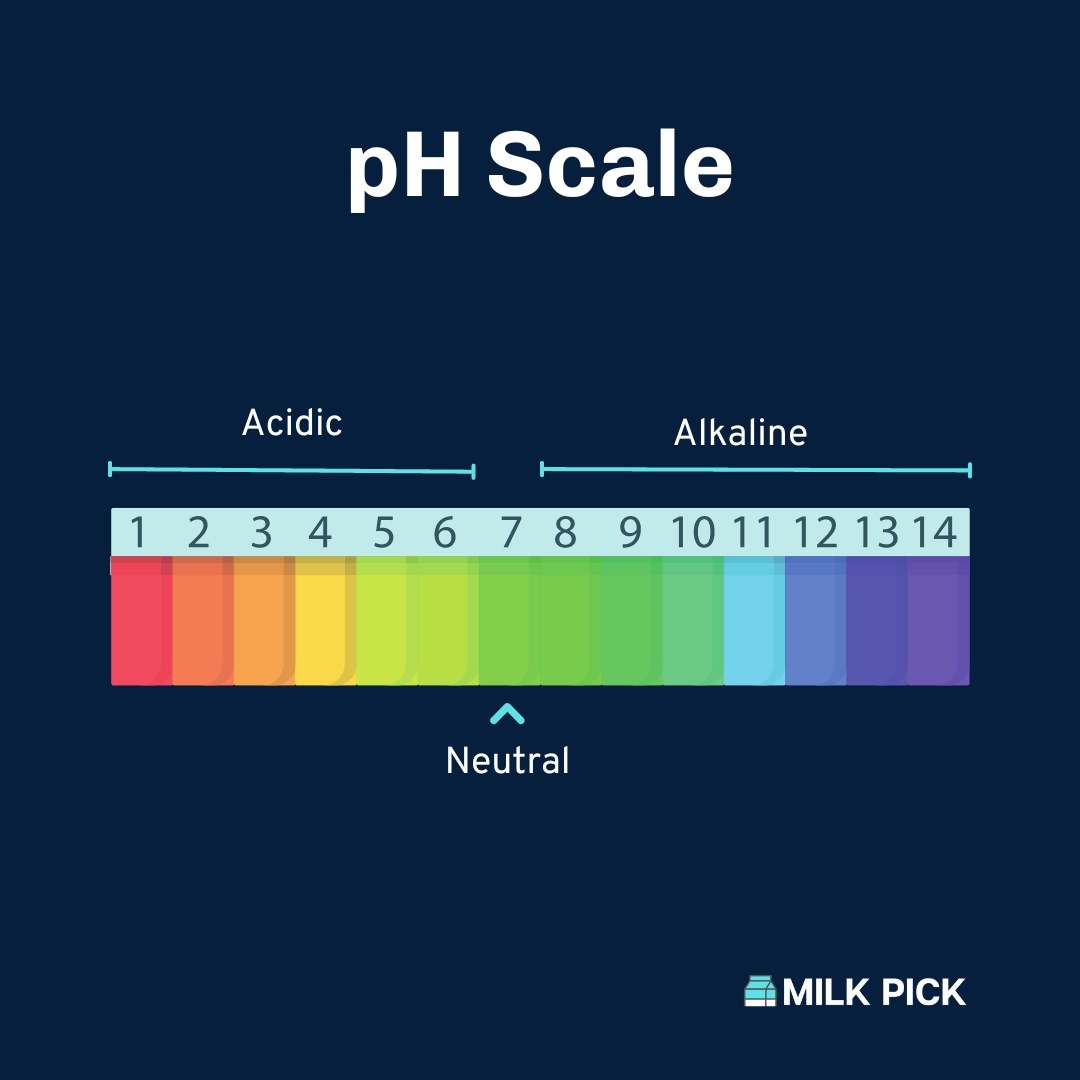
Foods are rated on the pH scale for a few reasons.
Knowing a food’s pH primarily helps manufacturers make products that taste good and last longer.
High acidity (anything below a 7) is less prone to growing microorganisms, which is why many processed foods use citric or acetic acids as preservatives.
Many foods are naturally high in acidity, including:
Citrus fruit (limes, lemons, oranges)
Tomatoes and tomato-based products
Berries (raspberries, strawberries, cranberries)
Soda
Coffee
Beer and wine
Processed foods like frozen dinners and canned soups
Alkaline foods tend to contain a wide range of nutrients that keep the body strong and healthy. Foods that score high in alkalinity include:
Fruits (cantaloupe,watermelon)
Leafy greens (kale, spinach, broccoli)
Legumes (lentils, beans, chickpeas)
Vegetables (carrots, sweet potatoes)
Nuts (almonds, coconuts)
What is the pH of Almond Milk?
The pH of almond milk varies, depending on the brand and its ingredients. Generally, almond milk has a slightly alkaline pH level.
A 2018 analysis of cow’s milk and alternative milk found that unsweetened almond milk had a pH of about 6.48.
This analysis shows that unsweetened almond milk has a fairly neutral pH and may benefit the body's acidity levels overall.

Our Almond Milk pH Test
We decided to test the pH of two almond milk brands to see the results for ourselves. The two brands we chose were:
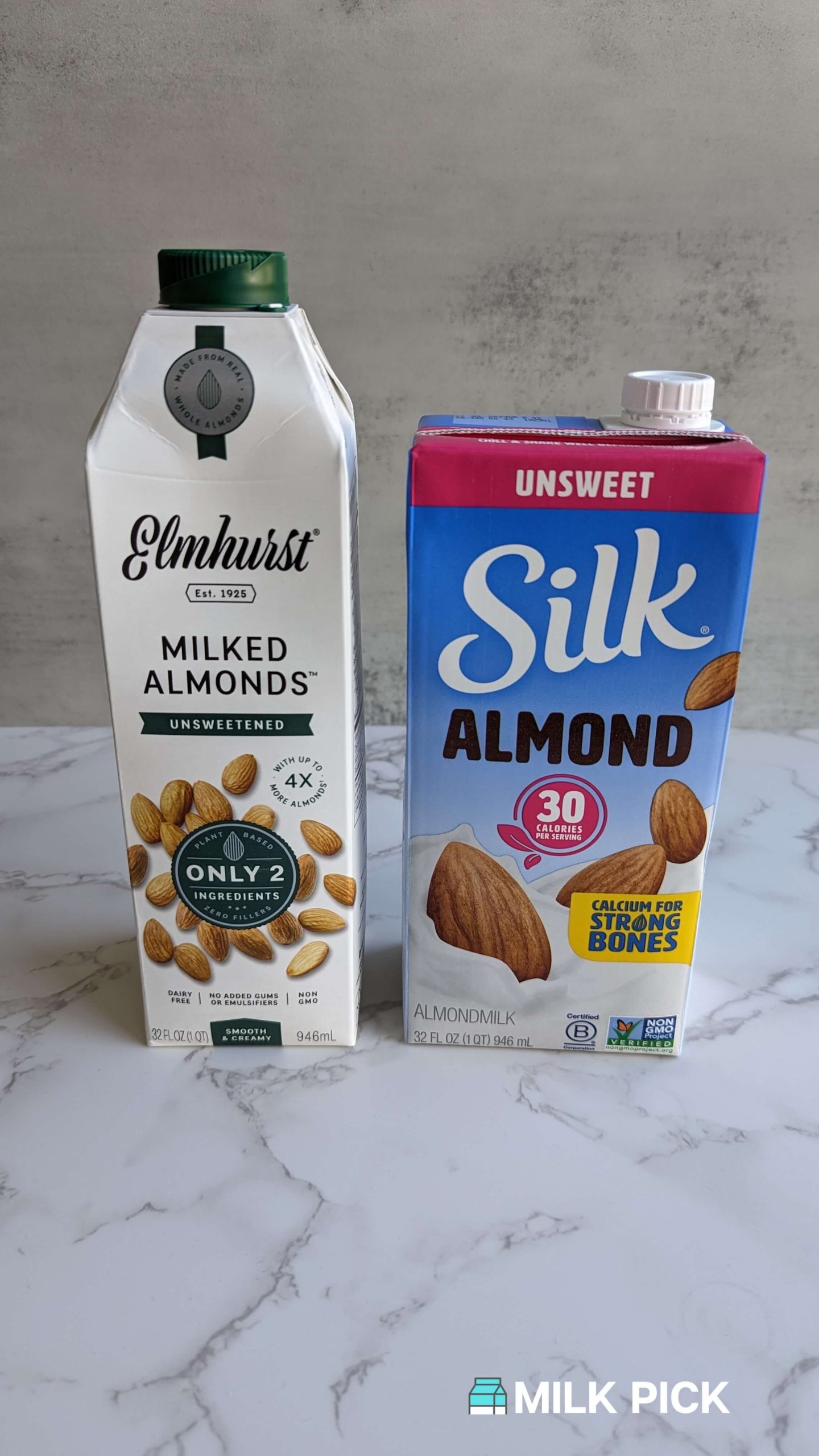
We chose these brands because they’re on two ends of the spectrum. Elmhurst only contains two ingredients—almonds and water.
On the other hand, Silk is fortified with nutrients and contains several emulsifiers and additives.
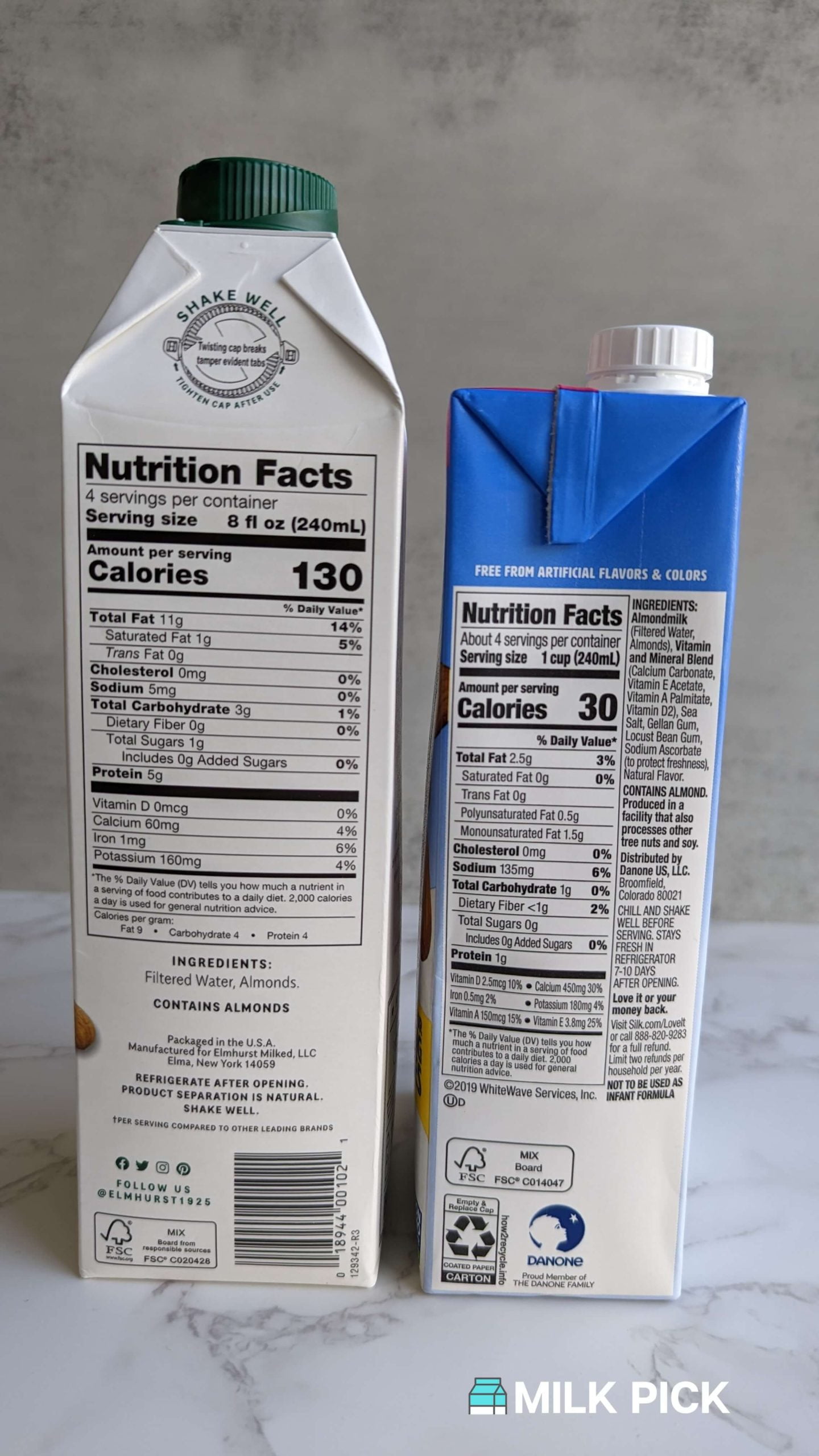
It’s also the second highest-selling almond milk brand in the U.S., behind Almond Breeze (according to data from Statista).
Our hypothesis: Elmhurst would have a more alkaline pH because it contains fewer added ingredients.
To run this test, we purchased a pH meter from Apera instruments since it was highly rated. Here is the exact tester if you’re interested.

We bought both almond milk cartons at the same time from the same grocery store and conducted the test the same day.
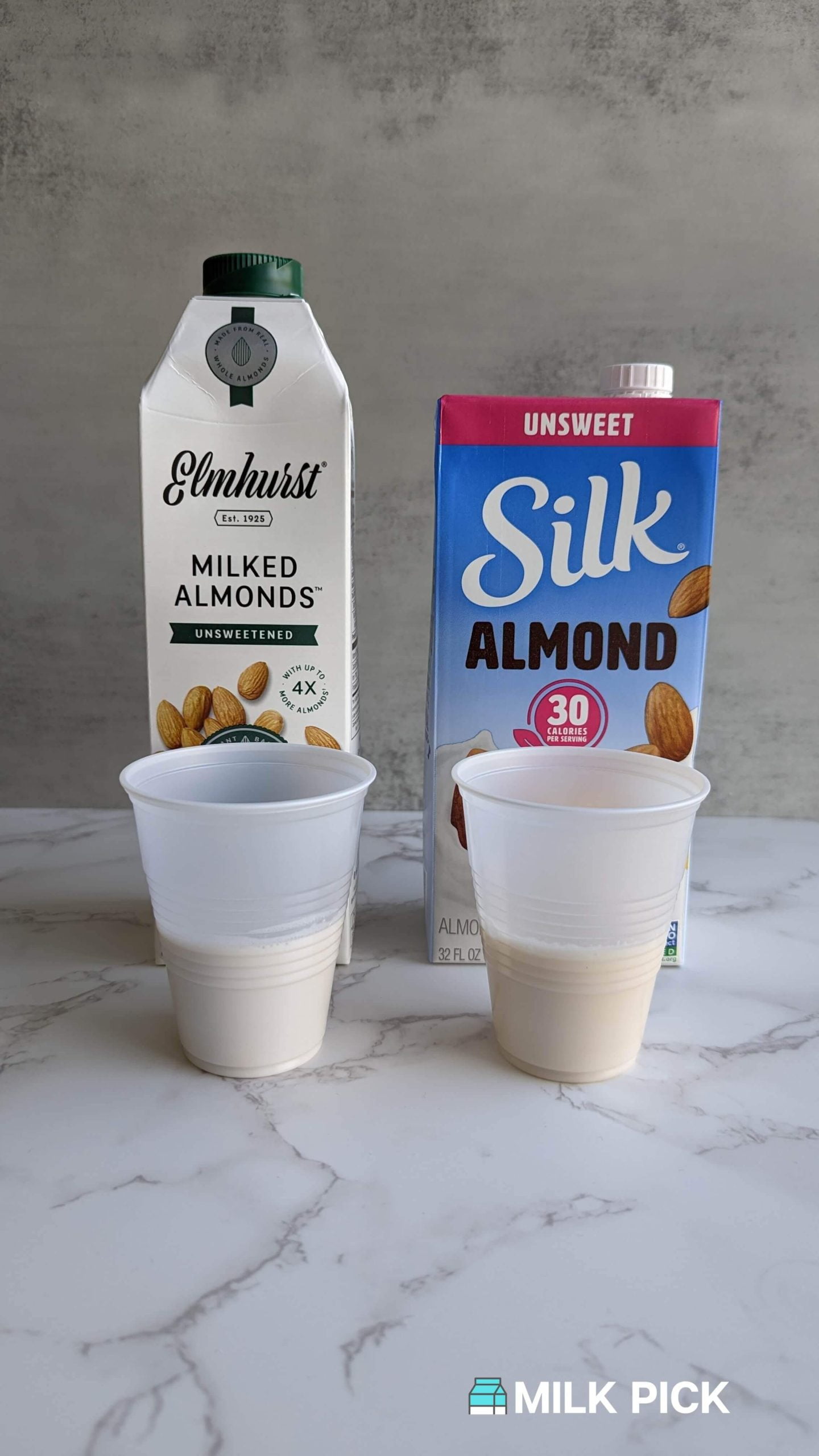
Both products were shelf stable, so we didn’t stick them in the refrigerator. The temperature of each milk during the test was:
- Elmhurst: 65.7°
- Silk: 65.3°
We calibrated the pH meter following the manufacturer’s instructions to ensure it’d be as accurate as possible.
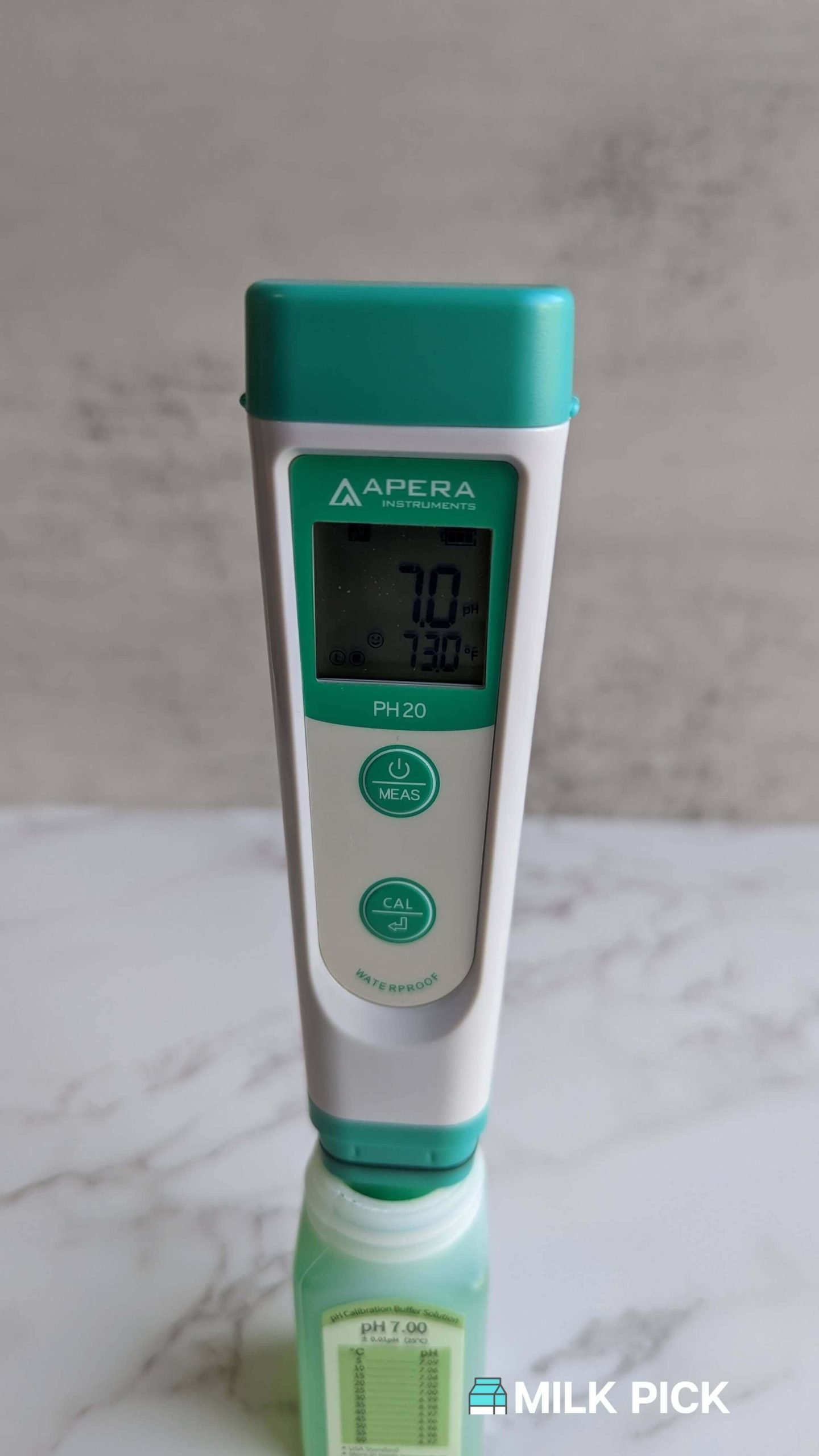
First, we tested the Elmhurst almond milk. We poured it into a small plastic cup, swirled it around in the liquid a bit, and let it sit until we got our reading.
The pH was 6.9.
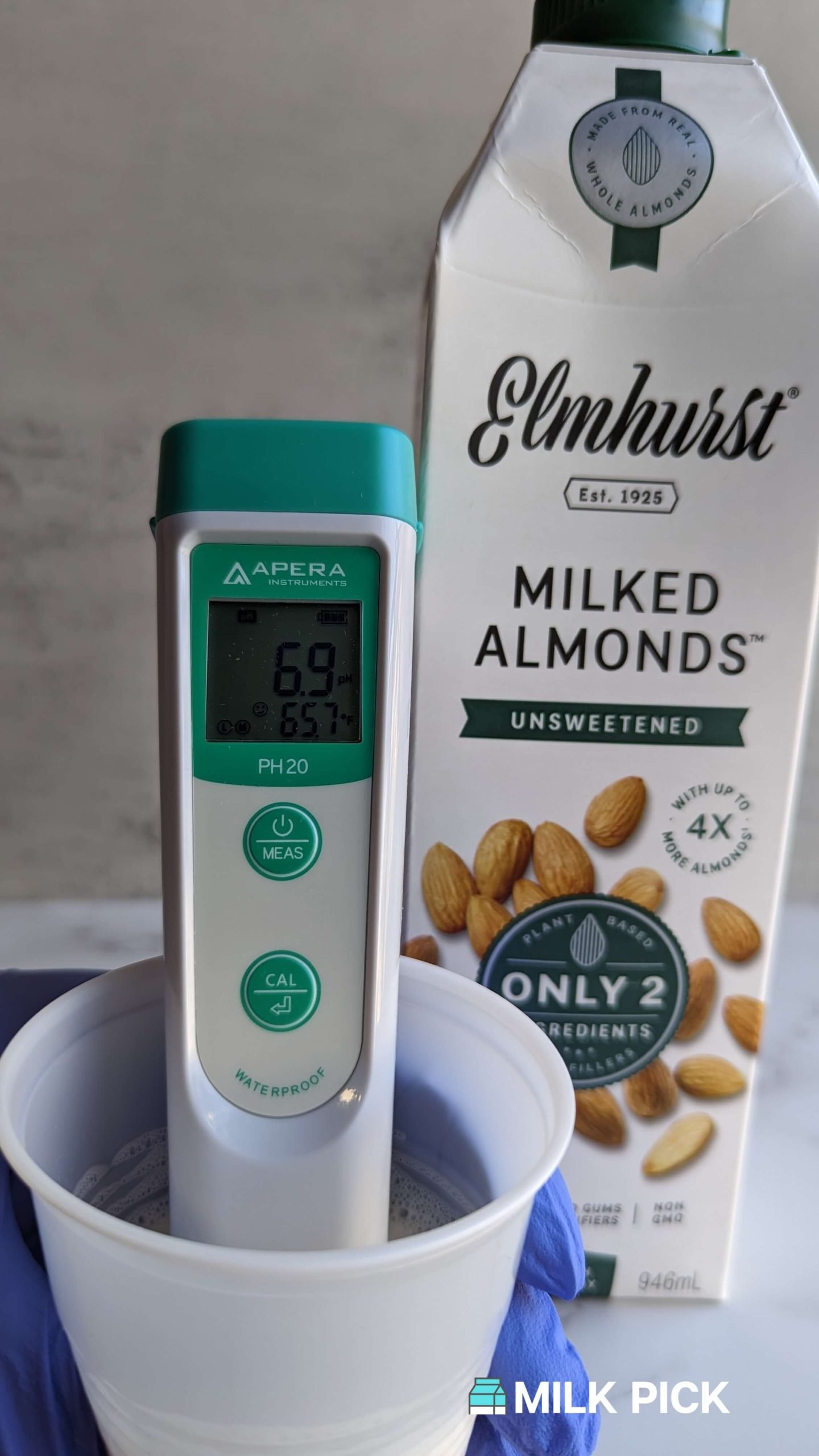
Here's a close-up of the result.
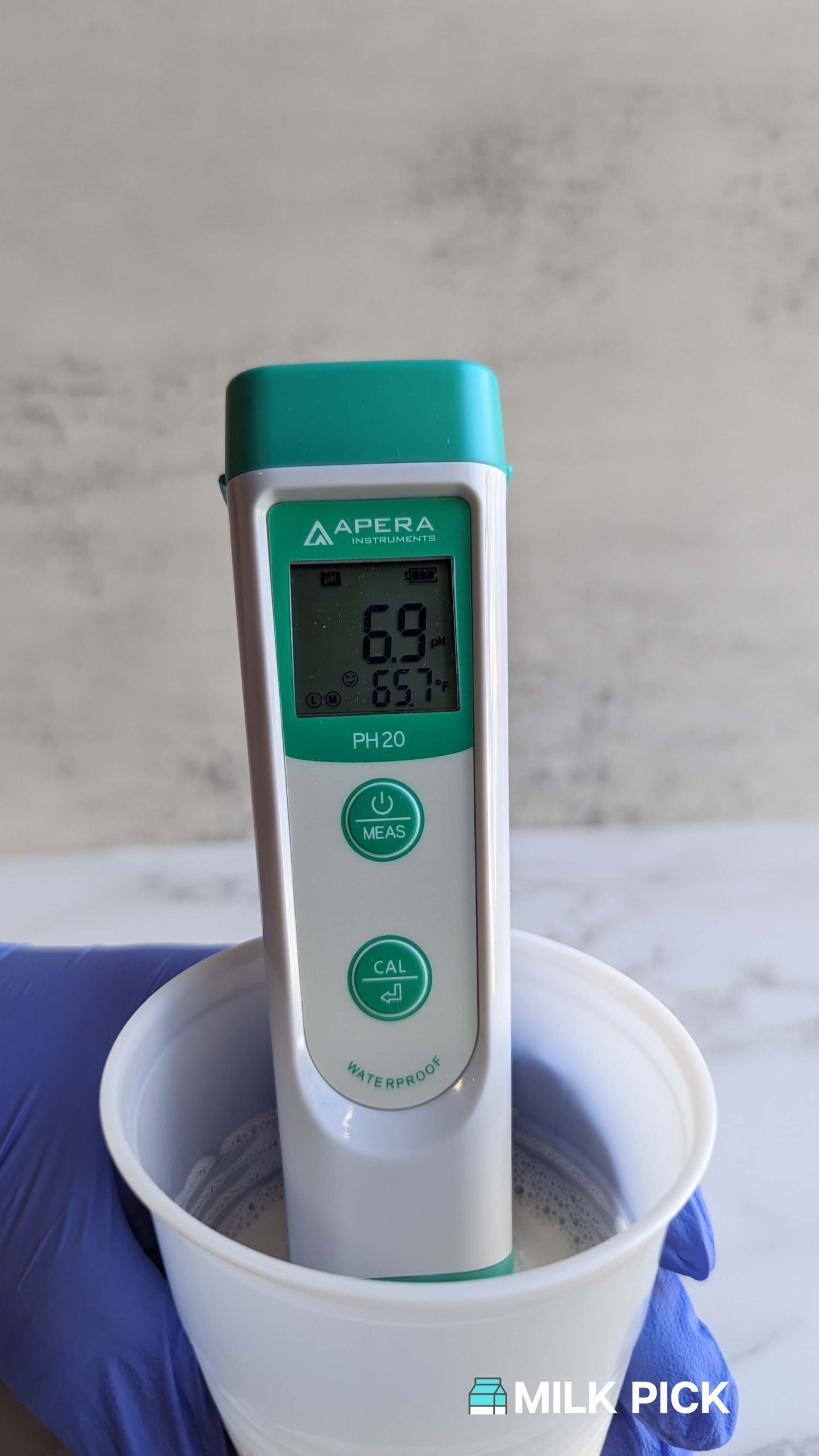
Next, we followed the same steps for the Silk almond milk. The pH was 7.6.
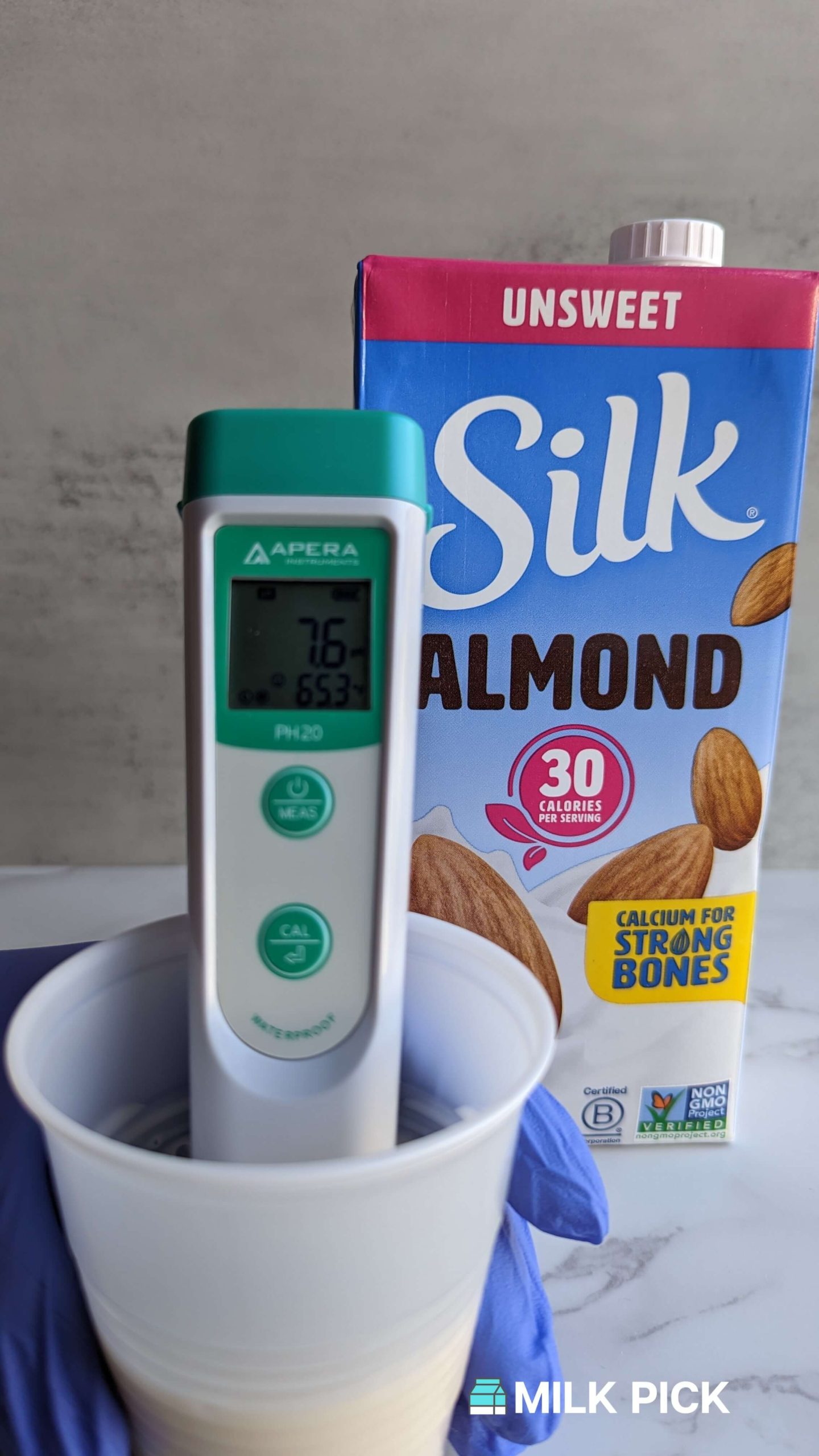
We were surprised!
To ensure we didn’t make a mistake, we ran the test a second time and got the same results.
Conclusion: Silk almond milk had a pH of 7.6, while Elmhurst had a pH of 6.9, meaning Silk almond milk was more alkaline.
We looked at the ingredients to understand why Silk had a higher pH. It turns out Silk contains a few ingredients that may increase pH.
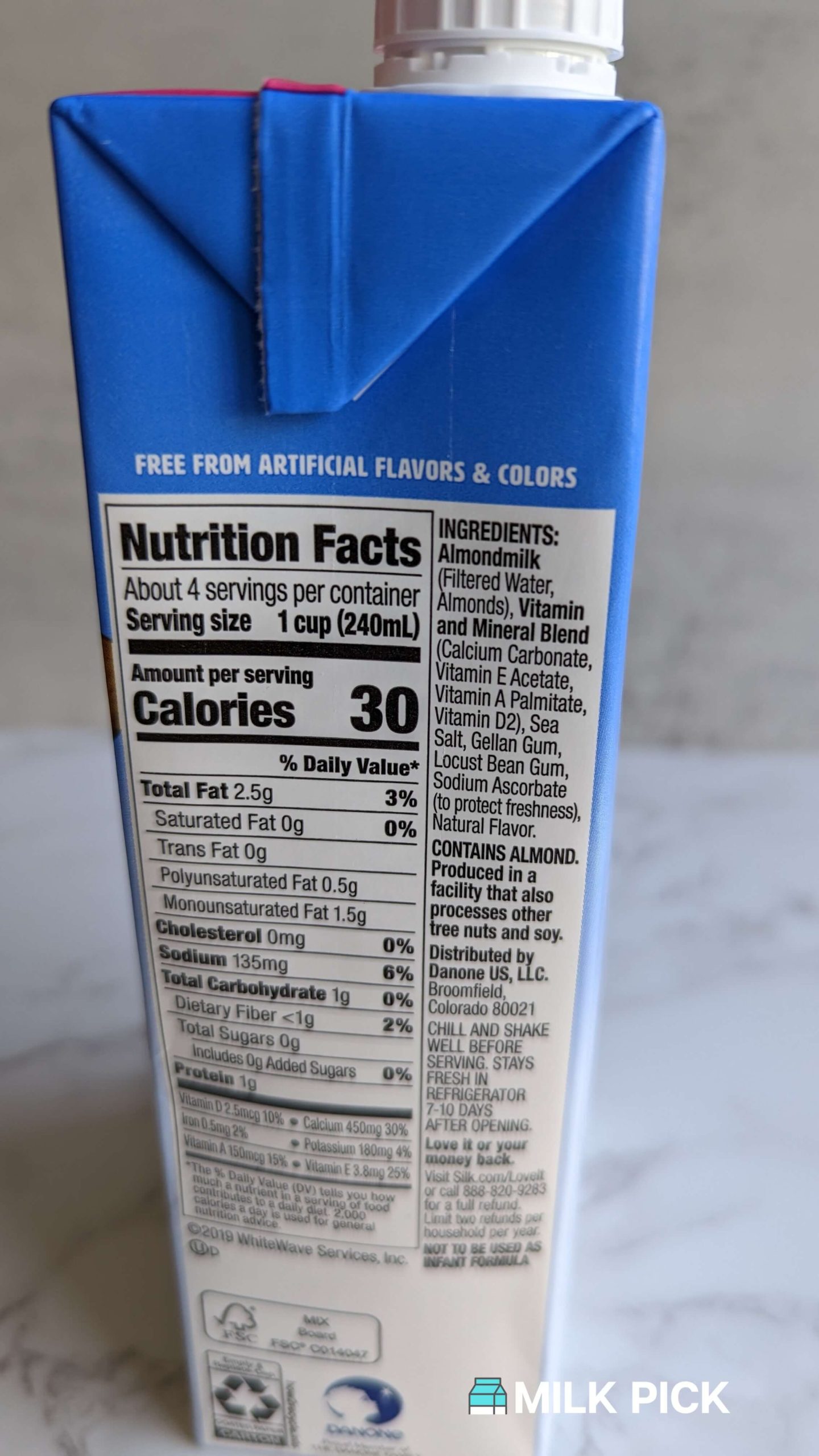
For instance, a University of Florida study showed that higher calcium carbonate in soils increases pH. And according to Chemicalbook.com, sodium ascorbate (another ingredient in Silk) can also increase the pH of water.
Since Elmhurst only contains two ingredients—water and almonds—it’s not shocking that the pH results were neutral.
Is Almond Milk Alkaline?
Based on our study, we can conclude that some almond milk is alkaline if it includes ingredients with a high pH.
As we pointed out, manufacturers can use ingredients like calcium carbonate and sodium ascorbate to maintain or improve the pH of almond milk.
Another common additive in almond milk (and other plant-based milk) is dipotassium phosphate. According to ScienceDirect, dipotassium phosphates “are used as buffering agents to maintain pH.”
Can Almond Milk Be Acidic?
Almond milk may be acidic if it contains ingredients with a low pH, like some artificial sweeteners.
For instance, the 2018 review of milk pH levels found that sucrose-sweetened almond milk (almond milk with added sugar) had a pH of around 4.45.
How Can an Alkaline Almond Milk Benefit Your Body?
Choosing neutral or slightly alkaline almond milk can benefit your health, especially if you have any underlying health factors such as digestive, thyroid, kidney, or other issues.
By incorporating more alkaline almond milk into your diet, you may see the following wellness benefits:
A More Balanced pH
Alkaline almond milk can help balance your body's pH by neutralizing acidity.
A balanced pH supports optimal health and reduces your risk of adverse health conditions caused by a highly acidic diet.
Minerals like calcium, magnesium, and potassium help maintain a healthy pH and are found in many almond milk products.
For example, Three Trees Unsweetened Almond Milk has calcium, iron, and potassium that can help you balance acidity in your body.
Improve Digestion
Alkaline almond milk can help improve digestion by reducing acidity in the stomach.
Your stomach has a pH of between 1.5 and 2.0 and produces hydrochloric acid, which helps to break down food and kill bacteria.
However, if your stomach becomes too acidic, it can lead to symptoms such as:
Stomach pain
Bloating
Indigestion
Chronic conditions like ulcerative colitis
Bry drinking alkaline almond milk, you can lessen painful digestive symptoms such as stomach bloating and cramping. It can also help soothe inflamed stomach lining and reduce irritation.
How Can You Check the pH of Almond Milk?
Understanding how the pH of almond milk affects your body can help you choose the right product, but how do you check the specific pH of almond milk in your grocery store or home?
Typically, foods, including almond milk, don’t list their pH levels on their labels.
The FDA does not require it, and a product’s pH can change based on its batch, preparation method, and storage conditions, making it challenging to label accurately.
Although you can reference studies like ours to get an idea of the general pH of almond milk, the only way to get a completely accurate measurement is by testing it yourself.
You can check the pH of your almond milk by using pH test strips or a pH meter.
Test Strips
Test strips are the most simple and cost-effective way to measure the pH level of a food.
These strips are pieces of litmus paper that change color depending on the pH level of the food you’re testing.
You can find affordable stips online for around $10 to $30, depending on where you purchase them.
You'll want to follow the instructions to use pH test strips for almond milk.
Usually, the process involves dipping the paper into the liquid, then comparing it to an accompanying color chart.
Match the color of the litmus paper to the chart to determine the almond milk’s pH level.
pH Meter
A pH meter is a handheld tool that contains a probe that measures the pH of a substance. It’s what we used in our test.
To get a reading, insert the meter’s probe into the almond milk and read the pH value on a digital display.
Here’s a video from the brand we used that shows the same process we used to test the pH of our almond milk.
These tools are a bit more pricey than test strips but can provide accurate readings. Investing in a pH meter may be worth it if you need to test the pH level of your almond milk or other foods for specific health conditions.
What Effect Do Highly Acidic Foods Have on the Body?
Our bodies typically maintain a pH between 7.35 and 7.45, which is slightly alkaline.
This occurs through natural chemical processes that stabilize the pH level.
A stable pH level is important because when the body’s pH becomes unbalanced, it can lead to health problems like chronic diseases, inflammation, and digestive issues.
Weakened Bones
A highly acidic diet can lower your body’s pH. High acid levels can lead to bone loss due to your body pulling calcium from your bones to try and achieve a balanced pH.
While this typically only happens if you have kidney issues or other health conditions, it can be a concern if you don’t eat a balanced diet.
Acidic foods like coffee and soda can also cause damage to your teeth, wearing down your enamel over time.
Eating highly acidic foods can lead to issues like cavities or infections if you don’t receive proper dental treatment.
Inflammation
A diet high in acidic foods can also increase inflammation.
A 2019 study on breast cancer survivors found an association between dietary acid load (the amount of acid in the diet) and inflammation.
This study, in particular, tied inflammation to the increased risk of breast cancer.
In general, inflammation factors into the development of many other chronic diseases, such as heart disease and diabetes.
Related: Is Almond Milk Anti-Inflammatory?
Digestive Issues
Acidic foods can cause digestive issues for many people.
Acid can irritate your stomach lining and interfere with your body’s digestive process.
Eating too many acidic foods can cause stomach pain, bloating, and indigestion if you have conditions like GERD, IBD, or IBS. For people with gastritis or stomach ulcers, acidic foods can increase painful symptoms, making it difficult to digest normally.
Effects of Alkaline Foods on the Body
Alkaline-forming foods typically have a more beneficial impact on the body than acid-forming foods. Low-acid foods like kale, almonds, and grapes can lessen heartburn symptoms or acid reflux.
Some studies have shown that alkaline foods may help remove acid from the blood, which reduces inflammation. Others have demonstrated that a diet high in alkaline foods can help the body retain muscle mass.
Research shows that alkaline foods contain beneficial nutrients for the body, like phosphorus, calcium, zinc, iron, and other vitamins and minerals.
Eating a diet high in alkaline foods can reduce or neutralize your body’s acidity levels and keep you feeling healthy.
Is “Alkaline” Almond Milk Worth It?
At Milk Pick, we generally recommend drinking almond milk with as few additives as possible. However, we realize Silk’s higher pH might confuse some of you.
Our suggestion is to weigh the importance of a high pH against the rest of the ingredients in any almond milk you buy.
If necessary, consult with a medical professional to decide whether or not the ingredient list for your almond milk of choice will be beneficial or harmful to your health.
At the end of the day, there isn’t an almond milk brand that works for everyone.
We’ll continue to test other brands and gather data so we can provide you with the most data so you can make an informed decision about what almond milk you choose!
